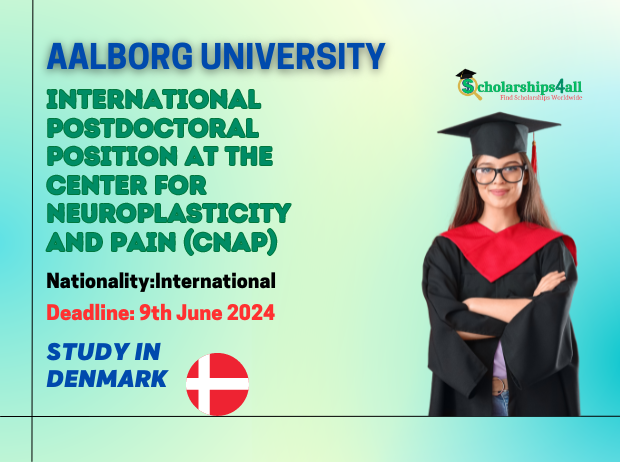International Postdoctoral Position at the Center for Neuroplasticity and Pain (Cnap) in Denmark
Description
The Center for Neuroplasticity and Pain (CNAP) at Aalborg University is excited to announce the availability of multiple postdoctoral fellowship positions in the field of human pain research. These positions are slated to begin on 1st August 2024 or soon thereafter and will provide an opportunity to engage in groundbreaking research on pain neuroplasticity over a period of 2 years.
CNAP’s mission is to probe the complexities of pain neuroplasticity and translate these insights into potential new treatments for persistent pain. With world-class facilities and a strong interdisciplinary team, CNAP provides a vibrant, collaborative environment for researchers passionate about making significant contributions to the field of pain science.
Established in 1974, Aalborg University is a renowned institution recognized for its innovative approach to education and research. AAU is celebrated for its problem-based learning (PBL) model, which emphasizes collaboration, real-world challenges, and interdisciplinary solutions. This pedagogical method has positioned the university as a leader in engineering, natural sciences, social sciences, and humanities. With campuses in Aalborg, Copenhagen, and Esbjerg, AAU attracts a diverse student body and fosters a global perspective in both its academic programs and research initiatives.
Application Deadline: 9th June 2024
Brief Description
- University or Organization: Aalborg University
- Department: Department of Health Science and Technology
- Course Level: Postdoctoral Fellowship
- Award: Competitive salary and benefits
- Access Mode: Online application
- Number of Awards: Multiple positions available
- Nationality: International
- The award can be taken in: Denmark
Eligibility
- Eligible Countries: Open to candidates from all nationalities.
- Acceptable Course or Subjects: The fellowship supports research in any subject related to the study of pain neuroplasticity as offered by CNAP.
- Admissible Criteria: Applicants must meet the following criteria:
- Hold a PhD in neuroscience, medicine, biomedical engineering, physiotherapy, physiology, or a related field.
- Demonstrate a strong interest and experience in pain research.
- Possess excellent analytical, problem-solving, and collaborative skills.
- Have a high level of proficiency in English, both spoken and written.
- Show potential for innovative research in pain neuroplasticity.
How to Apply
Interested candidates must submit their application online, including:
- A motivated statement detailing their reasons for applying, qualifications relevant to the position, and future aspirations.
- A current CV (preferably in the EU format) clearly outlining their educational background, research experience, and skill set.
- Copies of relevant diplomas (Master’s and PhD), with English translations if necessary.
- A complete list of publications, with up to 5 key works highlighted for consideration.
- Information on dissemination activities such as committee participation, organizational roles, or public outreach.
- Additional qualifications and reference letters from previous mentors or supervisors.
Benefits
Selected fellows will enjoy:
- A competitive salary package.
- Danish health insurance coverage.
- Travel funds to attend and present at scientific conferences.
- Access to state-of-the-art research facilities and equipment.
- Support with relocation to Aalborg, Denmark.
For further details on this opportunity and to apply, please visit the CNAP website or contact Professor Thomas Graven-Nielsen at [email protected].































